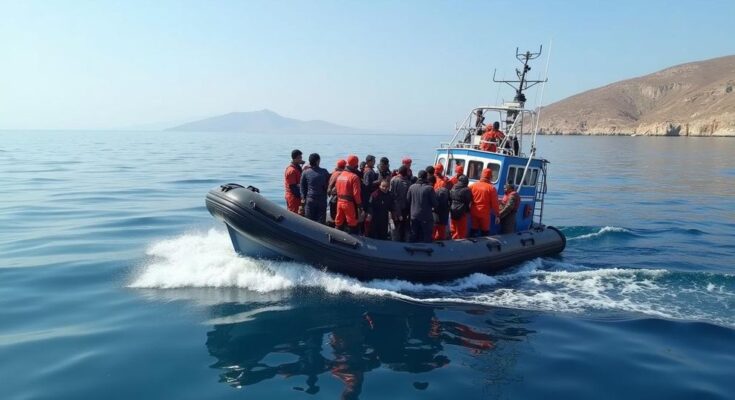A tragic boat accident off the island of Kos claimed the lives of four migrants, including two children, during a smuggling attempt from Turkey. Twenty-seven individuals were rescued, while authorities brace for a potential surge in migration due to ongoing conflicts in Lebanon and Gaza. Deputy Minister for Migration, Sofia Voultepsi, emphasized the need for substantial reforms to the European Union migration pact being implemented in 2026.
On Tuesday, tragedy struck off the coast of the Greek island of Kos, resulting in the loss of four lives, including two children, during an incident involving a migrant smuggling vessel. According to the Greek coast guard, 27 individuals were rescued from the waters after the boat capsized, caused by a misjudgment made by the operator while navigating near the island. The survivors recounted that the vessel encountered difficulties, leading to ten passengers falling overboard, with the fatalities including two women and two children. Fortunately, no one else was reported missing after the coast guard’s response. As Greece braces for an anticipated increase in migrant flows resulting from ongoing conflicts in Lebanon and Gaza, authorities are concerned regarding the impact of wars in the Middle East and Africa, as well as the ongoing effects of climate change, which are projected to exert long-term immigration pressures on Europe. Sofia Voultepsi, the Deputy Minister for Migration, voiced concerns regarding the inadequacies of the recent European Union migration pact that lacks essential components for practical implementation. “We got the (agreement), but the basic piece is still missing: Returns,” she stated, emphasizing the immediate need for a unified asylum, return, and integration system in the EU. The EU migration agreement is anticipated to commence in mid-2026, following further negotiations among the 27 member states, addressing the urgent need for systematic responses to migration issues. In light of the escalating humanitarian crisis in Lebanon, due to Israeli airstrikes on Hezbollah, the urgency of coordinated migration strategies has grown. Greece remains a critical entry point for migrants attempting to reach the EU from Turkey and Libya, often at the peril of their lives on overcrowded vessels. Additionally, earlier on the same day, 81 migrants were rescued from an abandoned ship en route from Turkey to Italy, having reportedly paid exorbitant sums of $8,500 each for the journey. In contrast, an Italian naval vessel is slated to arrive at an Albanian port with a group of 16 migrants whose asylum processes will be handled in Albania, under a new five-year agreement with Italy. Furthermore, in Poland, Prime Minister Donald Tusk has proposed a temporary suspension of asylum rights as part of a new migration policy unveiled during a Cabinet meeting.
The ongoing migrant crisis in Europe has drawn attention to the precarious conditions under which individuals undertake perilous maritime journeys from conflict-ridden countries. The island of Kos, situated near Turkey, has become a focal point as migrants seek refuge from violence and instability in their home regions. The tragic incident involving the loss of four lives underscores the dangers faced by migrants in the Aegean Sea and highlights the urgent need for enhanced measures to manage migration effectively. The European Union’s recent migration pact aims to address some of these challenges, but there are significant concerns regarding its implementation and effectiveness amid continuously evolving geopolitical circumstances.
In summary, the recent maritime tragedy off the coast of the Greek island of Kos, which resulted in the deaths of four migrants, underscores the severe risks associated with migrant journeys across the Mediterranean. Greek authorities are preparing for an influx of migrants driven by regional conflicts, while calls for a more coordinated response within the European Union grow louder. The inadequacies of current migration agreements necessitate urgent reforms to establish a more comprehensive system for managing asylum seekers and return policies. Failure to address these issues may exacerbate the humanitarian crises unfolding at Europe’s borders.
Original Source: abcnews.go.com




